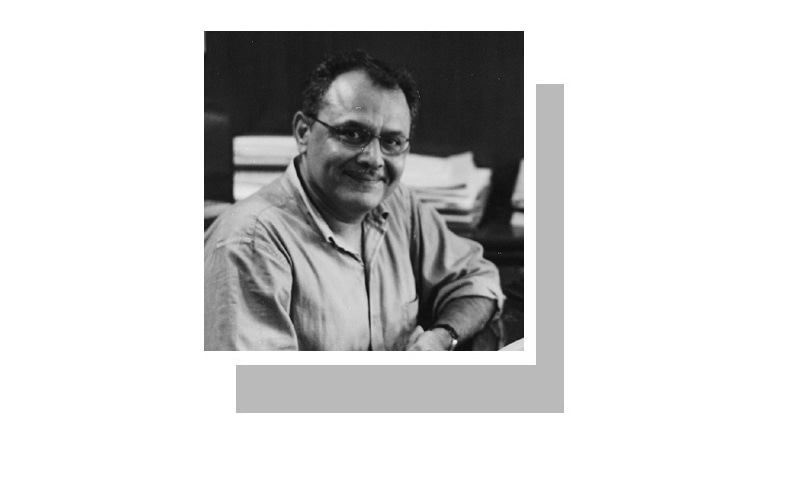
THE passing of Kuldip Nayar, the legendary reporter-editor and indefatigable peace activist, rekindled many memories: seeing him in person, interviewing him for the BBC to seek his opinion on Indian politics and on different twists and turns in Delhi’s dialogue with Islamabad.
His command over the Urdu language and of the issues being discussed was so total that he was the delight of the BBC Urdu journalists. Whenever on a visit to London he would drop by the then BBC World Service headquarters at Bush House.
Over the years one also saw him leading peace activists to the eastern side of the Wagah divide to meet Pakistani counterparts, including the indomitable Asma Jahangir, across the border where both groups would light candles to celebrate Pakistan and India’s independence days on midnight Aug 14-15.
This is not an obituary of Mr Nayar or even a proper tribute as I know many, many more people far more qualified to write that and do justice as they knew him much better than I would ever. I am merely reminiscing.
Kuldip Nayar had been trying to interview Dr A.Q. Khan for quite some time.
I have heard Kuldip Nayar telling a Delhi audience he started his journalistic career with an Urdu paper called Aghaz. He then went on to earn every possible accolade with wire services and writing and editing newspapers of high standing in English. His move to English journalism, he said himself, came at the advice of Molana Hasrat Mohani.
He would serve a stint in the upper house of parliament and also as his country’s high commissioner to the UK. But for me his peace activism and his imprisonment during Indira Gandhi’s emergency in the 1970s to uphold the freedom of expression were the major highlights of his staggeringly successful career. No less was the fact that he was first and foremost a reporter with countless scoops to his credit.
One such scoop was his interview with the man said to be the father of Pakistan’s nuclear programme, Dr A.Q. Khan. It was published on March 1, 1987 in which the metallurgist told the interviewer that basically, Pakistan had made a nuclear bomb.
This was the first public statement of its kind and confirmed suspicions in adversarial Delhi as well as many Western capitals that the West’s key military ally that had facilitated the humbling of the Soviet Union in Afghanistan had acquired nuclear weapons.
Nobody was surprised when the contents of the interview, spread over 70 minutes at Dr Khan’s E-7 residence, were denied by both Pakistan and the Pakistani scientist but the news had caused enough tremors to end the career of one editor.
Mushahid Hussain, who was then the editor of the influential Islamabad newspaper, The Muslim, took the Indian journalist to A.Q. Khan’s home for the interview at the end of January that year when relations between the two countries were strained.
The strained ties had spilled into the new year from the previous November/December. Indian military’s manoeuvres ‘Brasstacks’ were deemed provocative by the Pakistan army because the Indian forces were carrying out their exercises with live ammunition and Rawalpindi feared that the scope of these exercises could allow them to morph into an advance into Pakistan ‘soft underbelly’ in southern Punjab and northern Sindh.
Then CGS Lt-Gen Aslam Beg was credited with hurriedly drawing up plans and rather than rush extraordinary reinforcements to eastern Pakistan deemed vulnerable, he proposed a clockwise breach into Indian territory further north in Jammu and Kashmir itself in the event of any Indian aggression. Deployments followed.
I recall reading a report in India Today that from sometime in December 1986 to January 23, 1987, the ‘hotline’ between the DGMOs of the two countries fell silent for 45 days at a time of escalating tensions due to Pakistan’s concerns over the scope and the objectives of Brasstacks.
Kuldip Nayar said himself that he had been trying to interview A.Q. Khan for quite some time but in January 1987 finally Mushahid Husain informed him that the Pakistani scientist was prepared to grant him his request.
The opinion in Islamabad at the time was that such access and that too to an Indian journalist, no matter howsoever immaculate his professional credentials, would not have come without the approval or even the instigation of the Vice Chief of Army Staff Gen K.M. Arif who was personally tasked with the security of the nuclear programme and the personnel working on it.
Perhaps, the purpose of the access and the interview was to announce to India (and the world) that Pakistan possessed nuclear weapons to defend against any potential aggression given its unaddressed concerns regarding Brasstacks.
The interview was not published for a month. In the intervening period, negotiations at the foreign secretaries-level through February produced a de-escalation as two career diplomats Abdus Sattar and Alfred Gonsalves thrashed out the contentious issues.
When the nuclear story finally broke, then prime minister Muhammad Khan Junejo who was clearly not in the loop was livid. I have a vivid recollection of reports coming in from the PM House that he would shut down The Muslim whose editor he deemed responsible for what he saw as a national security breach.
Mushahid Hussain stepped down. The paper earned a reprieve. Junejo’s anger was perhaps justified as the timing of the interview publication brought fresh troubles for the country as US legislators toughened the conditions for aid to Pakistan.
Gratefully, no war was triggered between India and Pakistan but nobody was able to link this development definitively to the interview. Some thought Aslam Beg’s quickfire deployments may have done the trick as these were seen as out of the box and hence unanticipated. Who knows.
RIP Kuldip Nayar.
The writer is a former editor of Dawn.
Published in Dawn, August 25th, 2018










































